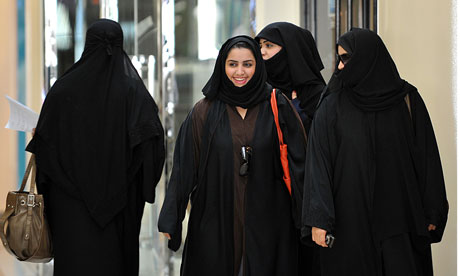August 12, 2012

Proposals for four similar women-only cities in Saudia Arabia have been submitted. Segregration of the sexes is applied throughout the kingdom. Photograph: AFP/Getty
A women-only industrial city dedicated to female workers is to be constructed in Saudi Arabia to provide a working environment that is in line with the kingdom’s strict customs.
The city, to be built in the Eastern Province city of Hofuf, is set to be the first of several planned for the Gulf kingdom. The aim is to allow more women to work and achieve greater financial independence, but to maintain the gender segregation, according to reports.
Proposals have also been submitted for four similar industrial cities exclusively for women entrepreneurs, employers and employees in Riyadh.
Segregation of the sexes is applied in Saudi Arabia, where Wahabi sharia law and tribal customs combine to create an ultra-conservative society that still does not allow women to drive. Saudi women are said to make up about 15% of the workforce, with most in female-only work places. Although the number of mixed gender workplaces has increased these are still few.
The proposals follow government instructions to create more job openings for women to enable them to have a more important role in the country’s development.
The Saudi Industrial Property Authority (Modon), which is developing the women-only industrial city at Hofuf, said it hoped the city would open next year. Prince Mansour bin Miteb bin Abdulaziz, minister of municipal and rural affairs, had approved the plan, a spokesperson said.
“I’m sure that women can demonstrate their efficiency in many aspects and clarify the industries that best suit their interests, nature and ability,” said Modon’s deputy director general, Saleh al-Rasheed.
The Hofuf development is expected to create about 5,000 jobs in textiles, pharmaceuticals and food-processing industries, with women-run firms and production lines. Modon said the Hofuf industrial site was a suitable location given its “proximity to residential neighbourhoods to facilitate the movement of women to and from the workplace”.
In a statement it added that the site was equipped “for women workers in environment and working conditions consistent with the privacy of women according to Islamic guidelines and regulations”.
The project has been proposed by a group of Saudi businesswomen, said Al Eqtisadiah, the business daily, quoting the business woman Hussa al-Aun. She told the paper: “The new industrial city should have a specialised training centre to help women develop their talents and train them to work at factories. This is essential to cut unemployment among our female graduates.”
The oil rich kingdom has one of the world’s largest disparities between male and female employment, with a gap of 23%, according to a recent Gallup poll, arabianbusiness.com reported.
An increasing number of firms were insisting that women had to be unmarried to qualify for employment; this violated the kingdom’s workforce regulations, reports said. “Some private companies are stipulating conditions such as a woman shall be recruited only if she is single or not pregnant if married,” Hatab al-Anazi, a ministry spokesman, is reported to have told the paper Arab News. “[That] is against the regulations approved by the ministry.”
Saudi Arabia attracts constant criticism from human rights groups for its systemic discrimination against women.
Last September King Abdullah, who has taken some tentative steps towards loosening strict gender segregation, announced that women would be able to vote in the 2015 local elections and for the consultative assembly.
In January the government enforced a law allowing Saudi women to be employed in lingerie and cosmetic shops, following a campaign by the women’s rights activist Reem Asaad. Previously women had to purchase underwear from male shop assistants. The plan is that by the end of this year women will replace men in stores selling abayas, the traditional black cloak worn by women.
Last month a poll of working women in Saudi Arabia by YouGov and Bayt.com found 65% wanted to achieve greater financial independence through their careers. Those under 25 also wanted to make use of their educational qualifications.
Source: The Guardian

Leave a Reply